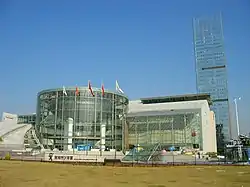
Shenzhen City Children's Palace
The Children's Palace (in Chinese: 少年宫) is a public facility in China where children engage in extra-curricular activities.
History and activity
The Pioneer movement and Pioneers Palace of the Soviet Union which began in 1930 spread to other Socialist countries, such as the People's Republic of China, where they are called Children's Palaces.
At a Children's Palace, the Chinese youth engage in extra-curricular activities, such as learning music, foreign languages, and computing skills, and doing sports. In larger cities, each district has set up its own Children's Palace, while there is also a City Children's Palace whose larger auditorium and planetarium are shared by the children of all the City's Districts.[1][2]
See also
- Mangyongdae Children's Palace, in North Korea
- Children's Palace station, a station of Shenzhen Metro
- Shanghai Changning Children's Palace, in Shanghai
References
- ↑ Dalian City Children's Palace Archived November 13, 2009, at the Wayback Machine (in Chinese)
- ↑ Shahekou District Children's Palace Archived July 15, 2011, at the Wayback Machine (in Chinese)
External links
- Guangzhou City Children's Palace (in Chinese)
This article is issued from Wikipedia. The text is licensed under Creative Commons - Attribution - Sharealike. Additional terms may apply for the media files.